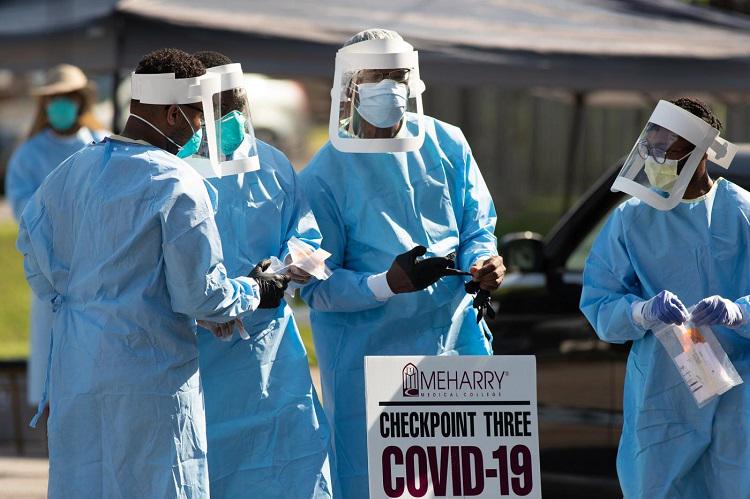On April 7, World Health Day, WHO will celebrate its 76th anniversary, and for 50 of those years, WHO has worked closely with the WCC.
"Our shared work in the areas of public health, promoting health, keeping the world safe, and serving the vulnerable so that more people benefit from universal health coverage has led to many achievements as well as the discovery of more challenges ahead," said WCC general secretary Rev. Prof. Dr. Jerry Pillay.
Specific issues of collaboration have included primary healthcare, promotion of breastfeeding, access to essential drugs, addressing HIV, and addressing pandemics and outbreaks such as EBOLA and COVID-19.
The WCC is planning an online conference in June to celebrate the relationship, and to explore how the contributions of faith communities can be further strengthened, particularly through the new WCC Commission of the Churches on Health and Healing.
A rich history
The WCC created the Christian Medical Commission in 1968 to help member churches encourage church-related health programs to develop ecumenical cooperation.
In its early years, the Christian Medical Commission emphasized the promotion of primary health care as a means of redressing the imbalance between sophisticated and expensive institutional medical care for a few—and hardly any for the rest.
The relationship between the WCC and WHO officially began when the newly formed WCC Christian Medical Commission held two conferences to examine the role of the church in providing healthcare through medical missions.
What followed was a theologically informed shift from hospital-based tertiary care in cities, many in post-colonial settings, to primary care delivery in rural as well as urban communities. A close relationship between the leaders of the Christian Medical Commission and the WHO facilitated a parallel and equally radical shift in the WHO's strategy, from a vertical or top-down focus on single diseases to the 1978 Declaration of Alma Ata, which focused on primary care. Both the WHO and the Christian Medical Mission saw primary care as a more just and egalitarian way to distribute resources and bring health to all.
At that time, primary health care was considered a radical approach to health services. The Christian Medical Commission, working through WCC member churches, greatly enhanced the case for primary health care within WHO and its subsequent support by nongovernmental organizations concerned with community health.
Key in the history of the WCC and WHO collaboration was the Alma Ata Declaration, which stated: "Governments have a responsibility for the health of their people, which can be fulfilled only by the provision of adequate health and social measures."
The declaration was adopted at the International Conference on Primary Health Care, Almaty, Kazakh Soviet Socialist Republic, in what was then the Soviet Union.
The declaration's specific inclusion of human rights and concern for equity and community participation dovetailed with the work the WCC was doing globally.
HIV response
Another strongly collaborative area is the response to HIV and AIDS, which the ecumenical movement has highlighted since the 1980s. In June 1986, a WCC study group recommended three main areas where the churches could respond: pastoral care, social ministry, and education focused on prevention. Educational material was produced that aimed to equip health workers, pastors, and teachers to assist communities in facing the HIV and AIDS epidemic. Further efforts have focused on theological and ethical reflection on aspects of the church's responsibility in responding adequately to the crisis.
In 1994, the WCC study on AIDS was commissioned by the central committee, and in 1996, the statement "The Impact of HIV/AIDS and the Church's Response" was adopted.
An important example of WCC's response in a holistic way has been the development of the concept of ' Health Promoting Churches' and the development of material to assist churches and congregations in becoming agents of healing and transformation in their communities.
WHO Faith Network
Currently, the WCC is a member of the WHO Faith Network, which was formalized in early 2022 with over 50 partners representing a diversity of faiths, including service providers, faith leaders, faith-based organizations, and academic institutions.
The network was convened with the goals of increasing access to accurate and relevant information and building a community of collaborative sharing on topics related to health emergency preparedness and response and the intersection between faith and public health.
And the partnership between faith-based groups and WHO keeps evolving.
WHO member states are currently negotiating a Pandemic Accord ahead of the World Health Assembly in May. Input into the accord is examining the critical roles played by faith partners during the COVID-19 pandemic, including inpatient care, community education, and engagement to prevent transmission and build confidence in vaccines and advocacy, as well as calling for equity in access to vaccines and other essential health services. Faith organizations, including members of the WHO Faith Network, have developed and released statements related to such an accord.
"The WCC's commitment to health and wellbeing remains strong, and we look forward to another 50 years of collaborating with the World Health Organization," concluded Pillay.
Originally from the World Council of Churches
CCD edited and reprinted with permission












